Since the 2018 Farm Bill legalized hemp across the nation, you may be wondering about the new requirements for quality testing. Well the USDA recently came out with guidelines for hemp cultivation, including requirements for testing the levels of THC. But the FDA is still reviewing testing requirements for hemp in cosmetics, food, and supplements.
In the meantime, states like Florida are creating state hemp programs to regulate the crop. State leaders understand that millions of people already purchase and rely on hemp-derived CBD in hopes of treating certain ailments like pain and anxiety. They want to guarantee these products are safe and properly labeled.

In this post:
- State Testing Regulations
- Hemp Testing Timeline
- First Phase Pre Harvest
- Second Phase Harvest
- Third Phase Post Harvest
- Fourth Phase Post Extraction
- Fifth Phase Final Product
- Test with ACS
State Hemp Testing Regulations
States like Indiana, Utah and Texas and Florida have proposed guidelines that may require hemp products to contain a QR code, which allows consumers to look up a Certificate of Analysis (COA) for potency and ingredient information. Florida may also regulate how and where to test, how to verify the results, and how to label and package your final product. These guidelines will require you to prove that your hemp is clean and free of contaminants.
You must also prove that your product contains the CBD potency that is listed on the label and consists of less than 0.3% THC. To guarantee a quality product, we suggest following the best practices below for hemp testing.
Hemp Testing Timeline
So when is the right time to start testing to your hemp and how can you ensure that your end product will be safe and effective for consumer use? As a leading provider of Cannabis, Hemp and CBD testing services, we’ve seen it all. We recommend you start the process from the ground up.
If you test early and continue testing throughout hemp’s growth cycle, you can correct potential errors along the way before wasting time and money on a contaminated batch. Let’s start with the pre-planting phase.
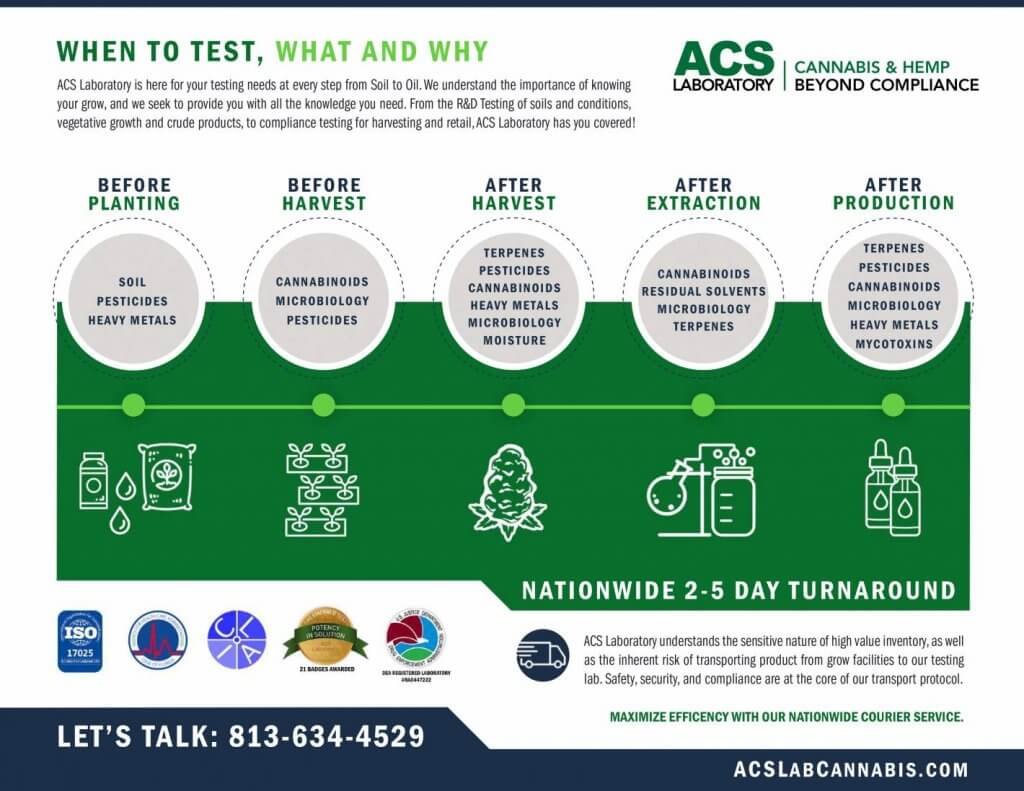
First Testing Phase: Pre-Planting
What to Test For: Heavy Metals & Chemical Elements
As hemp plants grow, they can draw in elements from the soil, which can contain heavy metals and other chemical agents. If left unchecked, these plants will grow to become contaminated hemp flower, oils or isolates. The most toxic agents include lead, cadmium, arsenic and mercury, which can cause kidney failure, vomiting, low blood pressure, and seizures to name a few.
This is not a risk you want to take. You want to provide a high-quality CBD hemp product that is clean, safe, and delivers results. The best way to guarantee a safe product and peace of mind is to test before planting.
Luckily if your soil is contaminated, you can scrape or treat it to inactivate the metal contamination and reduce the pH level. At ACS Laboratory, we work with growers who want to guarantee that their soil is safe. Call us today and we’ll review exactly how to send your sample for accurate results.
Second Testing Phase: Pre-Harvest
What to Test For: Cannabinoid Profile (Phenotyping) and Micronutrients
Now that you know the soil is clean, you’ll want to be sure that your hemp plant contains the right amount of CBD and other cannabinoids as well as the proper nutrient levels. You also need to be sure that your budding plant contains less than 0.3% THC for legal purposes. If you are in Florida, the regulations will require that you are using certified seeds from a certified seed supplier based on your desired strain; but the resulting flower may contain a different cannabinoid profile, color, smell or density than you expect.
One issue that can affect a hemp plants’ cannabinoid profile is time year and terrain in which they’re planted. Other factors include chemical exposure and environmental stress. This is why vegetative state potency testing can be a huge advantage to you and your customers.
Micronutrient tests ensure the plant is getting proper nutrients and is free of deficiencies that will affect cannabinoid development. Micronutrient levels can be tested and analyzed to pinpoint mineral deficiencies and ensure healthy growth and development during the R+D phase of the growth cycle.
Through vegetative potency tests, laboratories like ACS can analyze plants early in their life-cycles to identify the CBD and THC potency. This test helps you avoid the time-consuming process of raising up seedlings to maturity and waiting to test the flower after harvest. It helps enable rapid development of new CBD rich hemp that provide patients and consumers with the quality and safety they expect.
Third Testing Phase: Post-Harvest
What to Test For: Contaminants, Cannabinoids, Flavonoids, & Terpenes
Now that you’ve tested the soil and seedlings, you can feel much more confident that your post-harvest hemp will pass the remaining tests. However, degradation can still occur during the growth phase so you’ll need to test your post harvests as well. You’ll want to test your post-harvest hemp for moisture content because this is one of the key factors that can indicate risk for contamination.
Plants with moisture levels above 12% are at risk for fungi, bacteria, and insects, which can make your plants unsuitable for extraction. In addition to testing for moisture levels, you’ll need to test for residual pesticides because they can transfer to the human body. While it’s normal to use pesticides on plants, your crop should be flushed pre-harvest and cannot exceed the Department of Health’s accepted limitations in accordance with Statute 381.986.
Post-harvest testing is also a great time to confirm that your strain contains the concentration of CBD, THC, and has maintained its terpene profile that you expect as a result of your vegetative tests. To ensure accurate, consistent results make sure your sample is taken from one plot’s harvest and that the samples are sent in the same form (i.e. intact-plant, flowers, ground materials etc.), homogenous and not mixed with non-hemp materials or substances from another plot.
Work with our team of experts at ACS Laboratories to develop your hemp testing timeline today. We offer free courier service nationwide, as well as a 3-5 day turnaround for results.
Fourth Testing Phase: Post-Extraction
What to Test For: Residual Solvents, Microbial Agents, Cannabinoids, Terpenes
After your hemp has been harvested, dried and processed it is ready to go to a CBD processing facility to extract the CBD rich hemp oil from the flower. Liquid gas solvents are used as a normal part of the extraction process, which includes butane, ethanol, propane, hexane, and acetone. Solvents are safe for use during extraction, but if they are not properly removed from the oil, they can compromise the quality and safety of your product.
In addition to solvents, you’ll want to test the product for microbial agents after extraction. Microorganisms and bacteria can form at any time, compromising your finished product. At ACS, we test for 11 different solvents along with a complete microbiological analysis using state-of-the-art technology. We provide swift and accurate results.
Fifth Testing Phase: Post-Production
What to test for: Cannabinoid Potency
After extraction, you may further refine your hemp CBD to produce products sold in the form of oil tinctures, capsules, edibles or creams. At this point, you’ll want to know the products’ CBD and terpene potency with 100% certainty. This will ensure that your product is accurately labeled with the information your customers need to choose a product that’s right for their bodies and conditions.

Testing Hemp With ACS
At ACS Laboratory, we use gold-standard testing protocols including Ultra-High-Performance Liquid Chromatography and Real-Time Polymerase Chain Reaction technology to guarantee the accuracy of results. We’ve received 14 Emerald Badges for testing accuracy that include pesticide screening, potency in hemp flower, potency in hemp oil, potency in gummies, potency in solutions, mold levels, and moisture content.
We are an ISO/IEC 17025:2017 accredited laboratory and compliant with Florida’s Hemp Program requirements. We are also a DEA registered Laboratory and compliant with the new FDA Hemp Guidelines requiring Labs testing Hemp to register with the DEA.
To learn more about how and when to test your hemp, contact us online today or give us a call anytime at (813) 634-4529.


.jpeg)
.jpg)
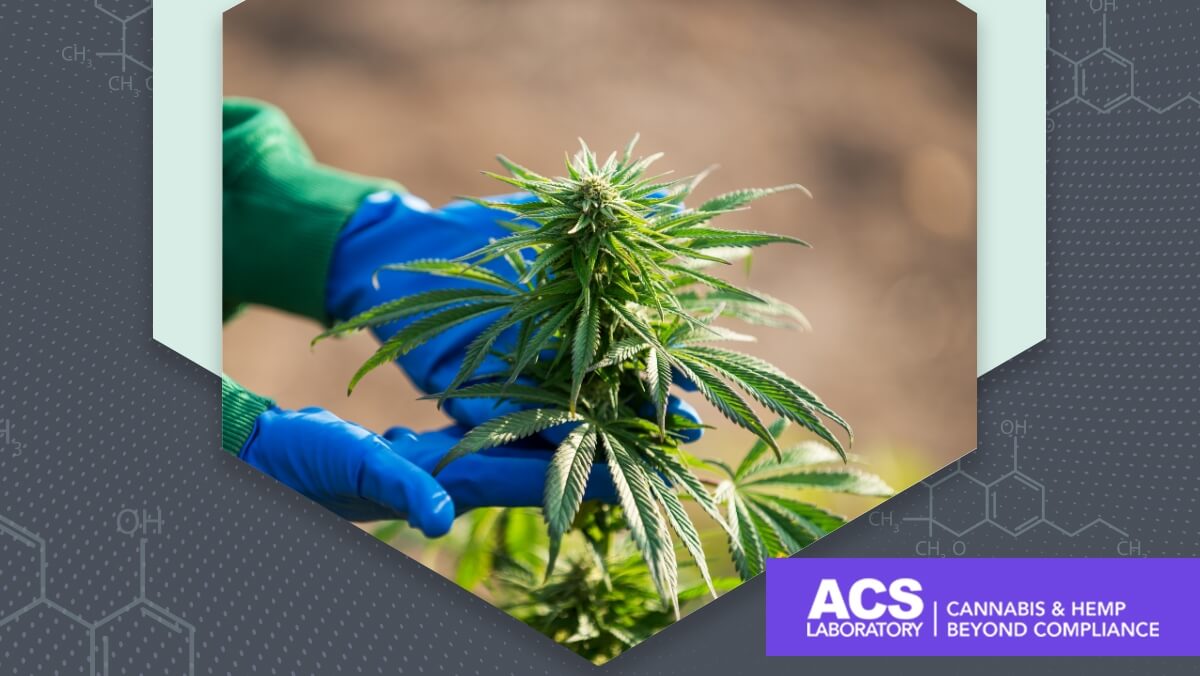
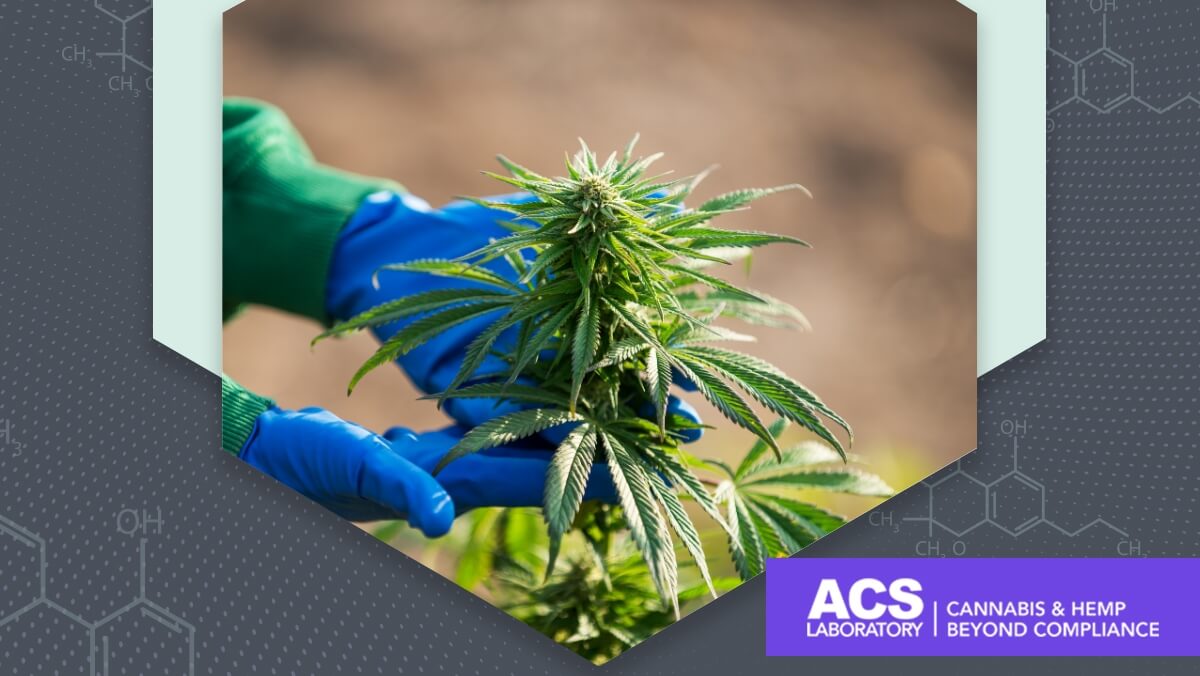
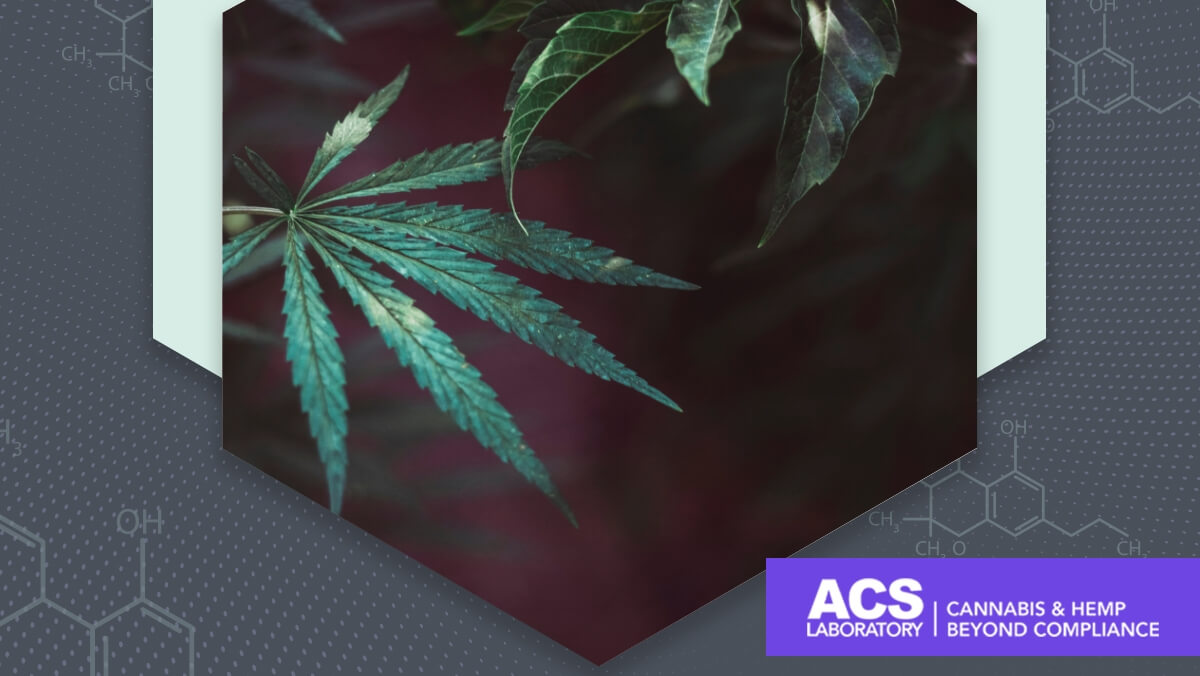
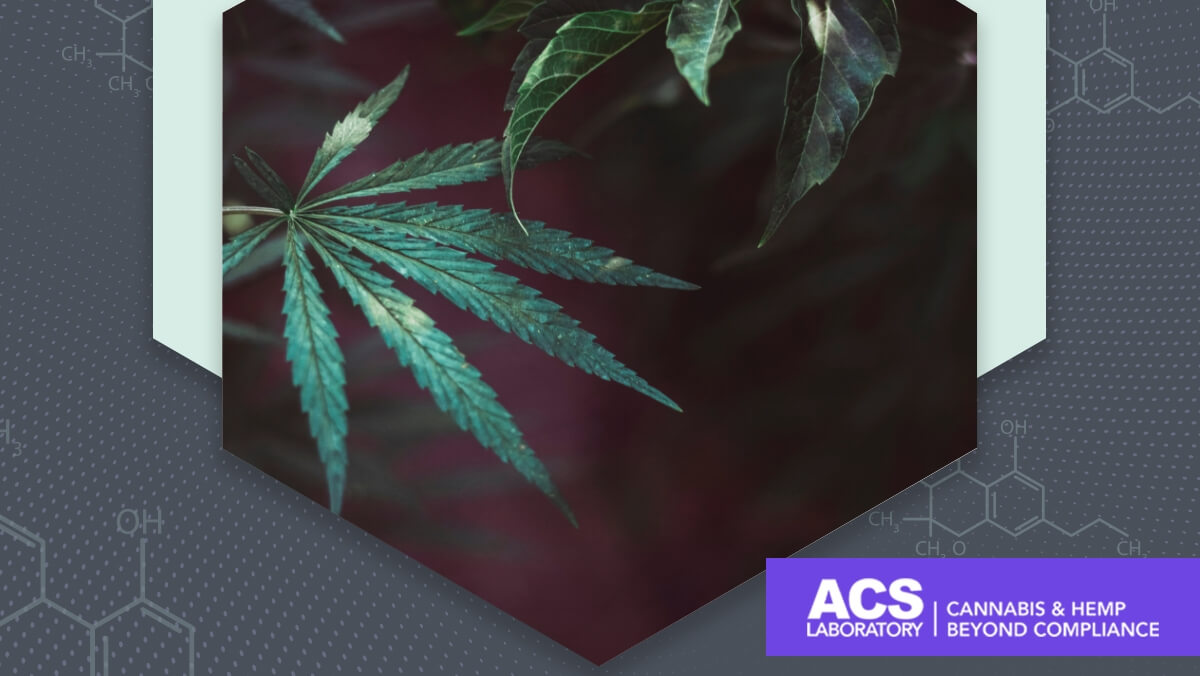

.png)
.png)
.png)
.png)
.png)